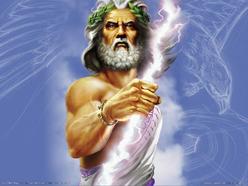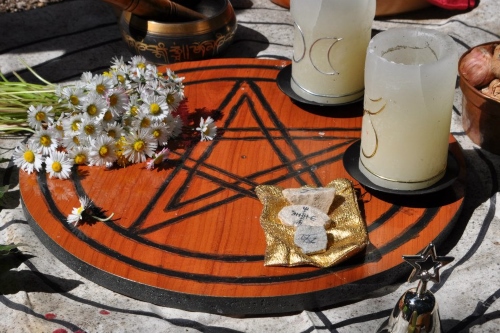The Wonder podcast often reveals insights which, though they have been hiding in plain sight, I’ve not noticed for years, if ever. Episode #28 supplied another one – one much larger than the episode which contained it – that Paganism – including many kinds of Paganism, from hard polytheism through Naturalistic Paganism – is, in many ways, fundamentally different from most other religions.
Isn’t every religion “different” from every other religion?
Is this true? Of course, each religion is “different” from all the others in some ways – or else it wouldn’t be a separately identifiable religion. Many of those differences are in specific details. For instance, ancient Greek religion had a pantheon of goddesses and gods – while ancient Roman religion was “different” in that the Roman goddesses and gods had different names. But as many of us who have studied these religions and pantheons knows, many of the goddesses and gods were often nearly identical to each other, sometimes being different mainly by having different names (such as the Roman goddess Diana being similar to the Greek goddess Artemis). Somewhat similarly, the Muslim supreme god shares a lot of traits with the Christian supreme god, etc.
But that’s not what I mean by “different”. I mean fundamentally different in important aspects of outlook, worldview, action, and our relationship to each other and the world – aspects which go beyond names of deities or language. These are aspects which profoundly affect what kind of life you may choose to live, what kind of social situations are most (and least) compatible with the religion – and the flip side of that, which is what kind of social situation, government or world is more or less likely to result if the given religion were nearly universal.
*All* Pagans?
Of course, religions are believed and practiced by human beings, and any generalization about humans or even subgroups of humans is likely to have some or even many exceptions. This is especially true about a subgroup which may contain millions or even hundreds of millions of individual humans. So I’ll apologize in advance for saying that this or that religion does or believes something that at least a few members don’t. Despite the fact that there are such a smaller number of Pagans than most other religions, this “problem” is even bigger in Paganism, where there is a wide diversity of both beliefs and practices, and so it’s even more likely that a given practice, view, action, or belief has plenty of Pagans for which it is incorrect.

Plus, few “rules” or claims about religions don’t have any exceptions (again, these are human beings we are talking about). As a result, nearly all of the ways I see Paganism as fundamentally different still have some other religions which share that given feature. After all, there are at least thousands of religions!
And, of course, there is the problem of defining “Paganism”. For that, I’ll use the Pagan Federation definition: “A polytheistic or pantheistic nature-worshipping religion.”. No definition is perfect, so some religions (especially aboriginal religions of various types) may fall on the blurry boundary. We’ll do what we can.
Still, each of these features is at least uncommon, or often rare, among other religions, and it’s very few religions which share all of the features I’ll discuss (and simply due to my own upbringing in Christianity, and being American, I have more knowledge to compare Paganism to Christianity than to, say, Shinto). So I’ll charge ahead, while being open to those who are kind enough to help me correct my mistakes and learn.
Even with all of those exceptions and nuances, I’ve realized that in so many ways, Paganism is radically different from many huge religions, and that these radical differences appear to have a large impact on our lives, on the lives of future generations, and on our world. The first difference (Part 1) will be about who is fundamentally in charge of your religion, and this touches on how each religion sees our human nature.
Blessed be!
Here are links to the many ways Paganism is fundamentally different from most religions around us today:
- Paganism Empowers You
- No Single Deity is in Control
- No Pope/supreme leader.
- No Penalty for Changing Beliefs/Leader (& no Hell)
- Paganism is Orthopraxic, not Orthodoxic
- Paganism is Focused on *this* world – Not on some afterlife
- In Paganism, this world is Good (and so are we), and not “Fallen” or Evil
- Paganism fosters Human Rights, and is not inherently Authoritarian
The Author: Jon Cleland Host
Starstuff, Contemplating: We are assemblages of ancient atoms forged in stars – atoms organized by history to the point of consciousness, now able to contemplate this sacred Universe of which we are a tiny, but wondrous, part.

Dr. Jon Cleland Host is a scientist who earned his PhD in materials science at Northwestern University & has conducted research at Hemlock Semiconductor and Dow Corning since 1997. He holds eight patents and has authored over three dozen internal scientific papers and eleven papers for peer-reviewed scientific journals, including the journal Nature. He has taught classes on biology, math, chemistry, physics and general science at Delta College and Saginaw Valley State University. Jon grew up near Pontiac, and has been building a reality-based spirituality for over 30 years, first as a Catholic and now as a Unitarian Universalist, including collaborating with Michael Dowd and Connie Barlow to spread the awe and wonder of the Great Story of our Universe (see www.thegreatstory.org, and the blog at evolutionarytimes.org). Jon and his wife have four sons, whom they embrace within a Universe-centered, Pagan, family spirituality. He currently moderates the yahoo group Naturalistic Paganism.
 Naturalistic Paganism
Naturalistic Paganism

